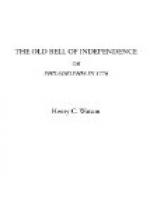“A body of two hundred and fifty men was stationed a short distance inland. In advance of these were several outposts, consisting of an officer and thirty men each. The sentinels were so near as to meet in their rounds, and were relieved every two hours. It chanced one dark and windy night, that Lilly and myself were sentinels on adjoining posts. All the sentinels were directed to fire on the least alarm, and retreat to the guard, where we were to make the best defence we could, until supported by the detachment in our rear. In front of me was a strip of woods, and the bay was so near that I could hear the dashing of the waves. It was near midnight, and occasionally a star was to be seen through the flying clouds. The hours passed heavily and cheerlessly away. The wind at times roared through the adjoining woods with astonishing violence. In a pause of the storm, as the wind died suddenly away, and was heard only moaning at a distance, I was startled by an unusual noise in the woods before me. Again I listened attentively, and imagined that I heard the heavy tread of a body of men, and the rattling of cartridge boxes. As I met Lilly, I informed him of my suspicions. All had been quiet in the rounds, but he promised to keep a good watch, and fire on the least alarm. We separated, and I had marched but a few rods, when I heard the following conversation. ‘Stand.’ The answer was from a speaker rapidly approaching, and in a low constrained voice. ’Stand yourself, and you shall not be injured. If you fire, you are a dead man. If you remain where you are, you shall not be harmed. If you move, I will run you through.’
“Scarcely had he spoken, when I saw the flash, and heard the report of Lilly’s gun. I saw a black mass rapidly advancing, at which I fired, and with all the sentinels retreated to the guard, consisting of thirty men, commanded by an ensign. An old barn had served them for a guard-house, and they barely had time to turn out, and parade in the road, as the British were getting over a fence within six rods of us, to the number of eighty, as we supposed. We fired upon them, and retreated in good order towards the detachment in the rear. The enemy, disappointed of their expected prey, pushed us hard, but we were soon reinforced, and they, in their turn, were compelled to retreat, and we followed them at their heels to the boats. We found the next morning that poor Frank Lilly, after discharging his musket, was followed so close by the enemy that he was unable to get over a fence, and he was run through with a bayonet. It was apparent, however, that there had been a violent struggle; for in front of his post was a British non-commissioned officer, one of the best formed men I ever saw, shot directly through the body. He died in great agonies, as the ground was torn up with his hands, and he had literally bitten the dust. We discovered long traces of blood, but never knew the extent of the enemy’s loss. Poor Riley took Lilly’s




